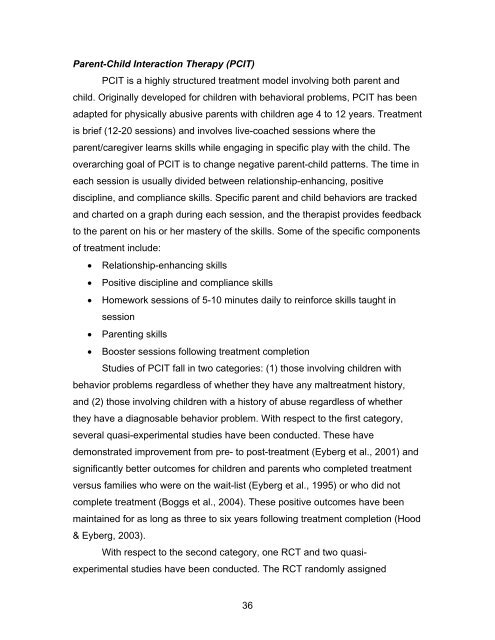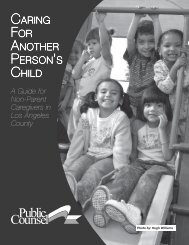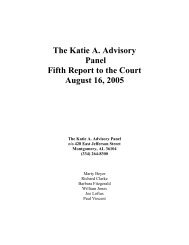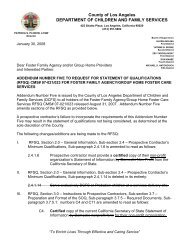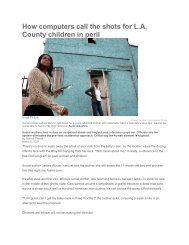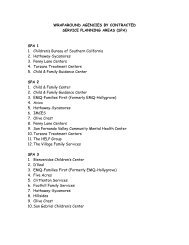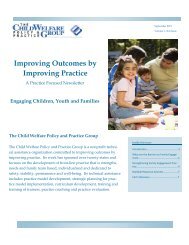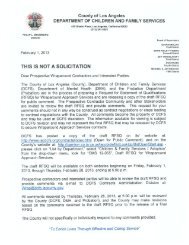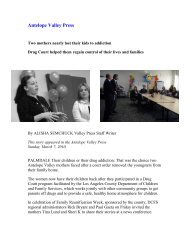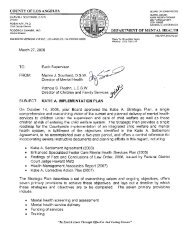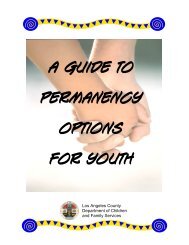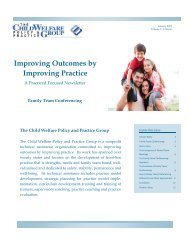Mental Health Care for Children and Adolescents in Foster Care ...
Mental Health Care for Children and Adolescents in Foster Care ...
Mental Health Care for Children and Adolescents in Foster Care ...
You also want an ePaper? Increase the reach of your titles
YUMPU automatically turns print PDFs into web optimized ePapers that Google loves.
Parent-Child Interaction Therapy (PCIT)<br />
PCIT is a highly structured treatment model <strong>in</strong>volv<strong>in</strong>g both parent <strong>and</strong><br />
child. Orig<strong>in</strong>ally developed <strong>for</strong> children with behavioral problems, PCIT has been<br />
adapted <strong>for</strong> physically abusive parents with children age 4 to 12 years. Treatment<br />
is brief (12-20 sessions) <strong>and</strong> <strong>in</strong>volves live-coached sessions where the<br />
parent/caregiver learns skills while engag<strong>in</strong>g <strong>in</strong> specific play with the child. The<br />
overarch<strong>in</strong>g goal of PCIT is to change negative parent-child patterns. The time <strong>in</strong><br />
each session is usually divided between relationship-enhanc<strong>in</strong>g, positive<br />
discipl<strong>in</strong>e, <strong>and</strong> compliance skills. Specific parent <strong>and</strong> child behaviors are tracked<br />
<strong>and</strong> charted on a graph dur<strong>in</strong>g each session, <strong>and</strong> the therapist provides feedback<br />
to the parent on his or her mastery of the skills. Some of the specific components<br />
of treatment <strong>in</strong>clude:<br />
• Relationship-enhanc<strong>in</strong>g skills<br />
• Positive discipl<strong>in</strong>e <strong>and</strong> compliance skills<br />
• Homework sessions of 5-10 m<strong>in</strong>utes daily to re<strong>in</strong><strong>for</strong>ce skills taught <strong>in</strong><br />
session<br />
• Parent<strong>in</strong>g skills<br />
• Booster sessions follow<strong>in</strong>g treatment completion<br />
Studies of PCIT fall <strong>in</strong> two categories: (1) those <strong>in</strong>volv<strong>in</strong>g children with<br />
behavior problems regardless of whether they have any maltreatment history,<br />
<strong>and</strong> (2) those <strong>in</strong>volv<strong>in</strong>g children with a history of abuse regardless of whether<br />
they have a diagnosable behavior problem. With respect to the first category,<br />
several quasi-experimental studies have been conducted. These have<br />
demonstrated improvement from pre- to post-treatment (Eyberg et al., 2001) <strong>and</strong><br />
significantly better outcomes <strong>for</strong> children <strong>and</strong> parents who completed treatment<br />
versus families who were on the wait-list (Eyberg et al., 1995) or who did not<br />
complete treatment (Boggs et al., 2004). These positive outcomes have been<br />
ma<strong>in</strong>ta<strong>in</strong>ed <strong>for</strong> as long as three to six years follow<strong>in</strong>g treatment completion (Hood<br />
& Eyberg, 2003).<br />
With respect to the second category, one RCT <strong>and</strong> two quasiexperimental<br />
studies have been conducted. The RCT r<strong>and</strong>omly assigned<br />
36


